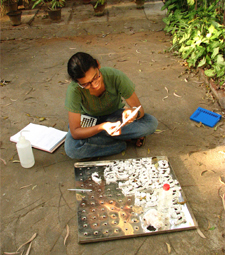CES PhD Program

The CES PhD programme is centered around empirical laboratory and field studies with theoretical and computational explorations aimed at addressing fundamental issues in ecology, evolution, animal behaviour and climate change. The department has excellent faculty, bright students and abides by the highest global research standards.
CES encourages and fosters an environment of learning and creativity. Graduate students have the freedom of using a multitude of techniques and approaches ranging from molecular biology to sophisticated computational methods to address scientific questions in broad areas of ecology. The biological sciences building where we are housed fosters interactions with other laboratories in neighboring departments within the institute. In addition, students are encouraged to interact with ecology laboratories in nearby research institutions in Bangalore, thus promoting collaborative and interdisciplinary scientific inquiry. Students are also offered access to some of the best field stations in India, well-equipped laboratories and an excellent library.
The department is also well funded by multiple government agencies such as MoEF, CSIR, DST and DBT, as well as by international funding agencies. Our students are often successful in seeking independent funding for their research.
The department encourages its students to attend national and international conferences in order to showcase their work, meet other researchers and scientists in the field and to widen career opportunities.
The typical duration for a PhD programme is around 5-7 years.
Entrance Process:
The entrance process will consist of a minimum eligibility, a qualifying exam and an interview. The exam and interview are both highly competitive, and over the last few years, only approximately 10% of the students who appear for the interview have been offered admission to the program.
All formalities, other than the interviews held at CES by the faculty, are conducted through the regular IISc Admission process. Please visit IISc admissions page for the online application procedure, which will contain advertisement, information on application submission, exam and interview dates.
Eligibility:
The candidate must have one of the following degrees:
- Masters degree in Life Sciences / Zoology / Biotechnology / Biochemistry / Microbiology / Mathematics/ Physics/ Engineering/ Psychology/ (2 yr full-time) Management or any related area
OR - Four year Bachelor’s degree in Science/Engineering
OR - Bachelor’s degree in Medicine (equivalent to MBBS)
Qualifying exam
The candidate should have qualified for one of the following entrance exams: GATE, or NET JRF.
NET JRF includes – Joint CSIR-UGC NET for JRF; UGC-NET for JRF; DBT JRF; ICMR JRF; JEST 2023; NBHM 2023; INSPIRE . Applicant must be qualified for Junior Research fellowship(JRF) to be eligible to apply through NET JRF mode.
The department sets the exam score cut-off for the interview and this may vary across years. If you are interested in a GATE exam, we encourage you to take the GATE "Ecology and Evolution" paper (paper code EY). Please check the GATE website for more details. You can find a list of textbooks and online resources here to prepare for GATE Ecology and Evolution.
Applicants can also apply through INSPIRE mode and must be in possession of valid provisional INSPIRE offer(for admission to research Programme) at the time of interview.
CES will conduct two rounds of interview of students who have made the cut-off through one of the national entrance exams. Selection will be based on performance at the interview and any documents submitted in the application package.
